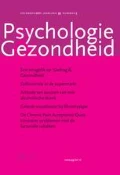summary
The Dutch version of the Outcome Questionnaire (OQ-45): a cross-cultural validation
The cross-cultural validity of the OQ in the Dutch population has been examined by comparing the psychometric properties and equivalence in factor structure and normative scores of the Dutch OQ with the original American version. Data were collected at university (N = 268), in community (N = 810) and in three mental health care organizations (N = 1920). Results showed that the psychometric properties of the Dutch OQ were adequate and similar to the original instrument. Some differences in equivalence were found though. In factor analysis, two additional factors were found: one consisting of Social Role items and another that reflected anxiety and somatic symptoms. Furthermore, normative scores were different for the Dutch and American samples and this resulted in different cut-off scores for estimating clinically significant change in the Dutch population.
Notes
In het oorspronkelijke artikel worden globale en specieke instrumenten gerapporteerd. In dit artikel is ervoor gekozen alleen de globale instrumenten weer te geven.
Literatuur
Arrindell, W. A., & Ettema, J.H.M. (1975). Klachtenlijst (SCL-90). Lisse: Swets & Zeitlinger.
Cohen, J. (1992). A power primer. Psychological Bulletin, 112, 155-159.
Cronbach, L. J. (1990). Essentials of psychological testing. New York, NY: Harper Collins Publishers.
Beurs, E. de, Dyck, R. van, Marquenie, L.A., Lange, A., & Blonk, R.W.B. (2001). De DASS: een vragenlijst voor het meten van depressie, angst en stress. Gedragstherapie, 34, 35-53.
Jong, A. de, & Lubbe, P.M. van der (2001). Groningse vragenlijst voor Sociaal Gedrag: Zelfbeoordelingsvrageniljsten voor het vaststellen van problemen in het interpersoonlijk functioneren (handleiding). Groningen: Rob Giel Onderzoekscentrum/Rijksuniversiteit Groningen, disciplinegroep Psychiatrie.
Jong, K. de, & Nugter, M.A. (2004). De Outcome Questionnaire: psychometrische kenmerken van de Nederlandse vertaling. Nederlandsch Tijdschrift voor Psychologie, 59, 76-79.
Derogatis, L.R. (1975). The Brief Symptom Inventory. Baltimore, MD: Clinical psychometrics unit.
Derogatis, L.R. (1977). The SCL-90 Manual: Scoring, admininstration and procedures for the SCL-90. Baltimore, MD: John Hopkins University School of Medicine, Clinical psychometrics unit.
Flaherty, J.A., Gaviria, F.M., Pathak, D., Mitchell, T., Wintrob, R., Richman, J.A. & Birz, S. (1988). Developing instruments for cross-cultural psychiatric research. Journal of Nervous Mental Disorders, 176, 257-63.
Gladis, M., Gosch, E.A., Dishuk, N.M., & Crits-Christoph, P. (1999). Quality of life: expanding the scope of clinical significance. Journal of Consulting & Clinical Psychology, 67, 320-331.
Jacobson, N.S., & Truax, P. (1991). Clinical significance: A statistical approach to defining meaningful change in psychotherapy research. Journal of Consulting and Clinical Psychology, 59, 12-19.
Kline, R.B. (1998). Principles and practice of structural equation modeling. New York: The Guilford Press.
Lambert, M.J., Burlingame, G.M., Umphress, V., Hansen, N.B., Vermeersch, D.A., Clouse, G.C., Christopherson, C. & Burlingame, G.M. (1996). The reliability and validity of the Outcome Questionnaire. Clinical Psychology & Psychotherapy, 3, 249-258.
Lambert, M.J., Hannöver, W., Nisslmüller, K., Richard, M., & Kordy, H. (2002). Fragebogen zum ergebnis von psychotherapie: Zur reliabilität und validitat der deutschen ubersetzung des Outcome Questionnaire 45.2 (OQ-45.2). Zeitschrift fur Klinische Psychologie und Psychotherapie: Forschung und Praxis, 31, 40-46.
Lambert, M.J., Morton, J.J., Hatfield, D.R., Harmon, C., Hamilton, S., Shimokawa, K., et al. (2004). Administration and scoring manual for the OQ-45.2 (Outcome Questionnaire) (3 ed.). Wilmington, DE: American Professional Credentialling Services LLC.
Lambert, M.J. (2007). Presidential address: What we have learned from a decade of research aimed at improving psychotherapy outcome in routine care. Psychotherapy Research, 17, 1-14.
Mueller, R.M., Lambert, M.J., & Burlingame, G.M. (1998). Construct validity of the outcome questionnaire: A confirmatory factor analysis. Journal of Personality Assessment, 70, 248-262.
Thalheimer, W., & Cook, S. (2002). How to calculate effect sizes from published research articles: A simplified methodology. Retrieved February, 2006, from http://work-learning.com/effect_sizes.html
Weissman, M.M., & Bothwell, S. (1976). Assessment of social adjustment by patient self-report. Archives of General Psychiatry, 33, 1111-1115.
Author information
Authors and Affiliations
Corresponding author
Additional information
Kim de Jong en Annet Nugter zijn werkzaam bij de Afdeling onderzoek, GGZ Noord-Holland-Noord, Heiloo. Kim de Jong is tevens werkzaam bij de Universiteit Leiden, evenals Marike Polak, Philip Spinhoven en Willem J. Heiser. Philip Spinhoven is tevens verbonden aan het Leids Universitair Medisch Centrum.
Dr. Hans Wagenborg, afdeling onderzoek en ontwikkeling van de Geestgronden, is kort na de acceptatie van het originele artikel overleden.
Mw. drs. K. de Jong, GGZ Noord-Holland-Noord, afdeling Onderzoek, Postbus 18, 1850 BA Heiloo
Rights and permissions
About this article
Cite this article
de Jong, K., Spinhoven, P. De Nederlandse versie van de Outcome Questionnaire (OQ-45): een crossculturele validatie. PSEG 36, 35–45 (2008). https://doi.org/10.1007/BF03077465
Issue Date:
DOI: https://doi.org/10.1007/BF03077465

